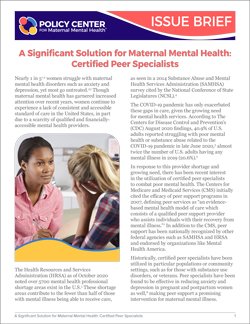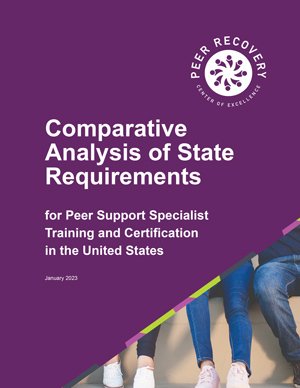Maternal Mental Health Certified Peer Support
Peer support provided by trained peer support specialists is a proven model for addressing mental health conditions. In 2007, the Centers for Medicare and Medicaid Service (CMS) identified peer support services for mental health to be an evidence-based practice. CMS deems the use of certified peer specialists reimbursable for states that choose to incorporate these services into their Medicaid plans. Peers who are certified by state-sanctioned training/certification programs are also able to be reimbursed by state Medicaid Programs. Generally, such peers are hired by organizations that bill Medicaid.
The Policy Center for Maternal Mental Health is Working to Propel the Use of Certified Peer Specialists
To augment well-established behavioral health treatment professional shortages, to provide those in need with trusted and knowledgeable support, to provide those with lived experience meaningful and needed paid work opportunities, and to build the capacity of obstetric providers (who are serving as the maternal medical home) in addressing maternal mental health disorders, the Policy Center is proud to be propelling the training and employment of state-certified peer specialists.
With philanthropic support, two studies have been conducted or launched.
Issue Brief
A Significant Solution for Maternal Mental Health: Certified Peer Specialists
Phase 1, Initial Pilot
The initial pilot, looked at the use of state-sanctioned training and certification in the maternal population, without modifications.
Phase 2, Pilot to Serve Black Mamas and Doulas
This phase tested the use of training adapted from Phase 1 for use in supporting the Black pregnant and postpartum population by training those with lived experience (maternal mental distress) and doulas to serve as certified peer specialists.
State Certification:
According to Mental Health America, generally, peers who live in a state with a state-sanctioned peer specialist certification (as of 3/2021 this includes all states except CO), and who wish to provide peer support, need to be certified to work as a peer specialist.
Similar to training, certification varies across the US.
Learn if your state has a peer specialist certification process and any related requirements, including work experience, here. Your state may require peers to have a certain number of hours of experience before providing peer support and before achieving certification.
Training:
Those interested in working as a peer support specialist will likely have to participate in some sort of training.
There are several maternal mental health peer training programs, however, it’s important to note that though these programs are helpful, they do not qualify as required training to become a state-certified peer specialist. Rather, these trainings are helpful to understand the nuances of serving the maternal/paternal (perinatal) population.
To be recognized as a peer support specialist in your state, a person must determine what type of training is required in the state or county. Doors to Wellbeing has a comprehensive list of training (and state certification requirements) and appropriate contact information in each state. Costs, payment options, and educational requirements also depend on location.
How to Implement Use of Certified Peer Specialists In Your Practice:
Are you offering clinical services and already contracted with your state Medicaid agency to serve/bill Medicaid enrollees? If yes, skip to 3.
Become a clinical or community entity that bills Medicaid services by contacting your state Medicaid agency. (If your agency offers community support but not clinical support you may still be eligible to become an agency that bills for certified peer specialist time.)
Find out who your state peer certifying body/training agency is by doing a web search on “[state] certified peer specialist training.”
Contact the training agency to find out if they are collecting who the mothers are who have been trained and/or ask the agency for their upcoming training schedule and encourage the patients you believe would be successful peer specialists to enroll in the training.
Have your peers join the Policy Center “Certified Peer Specialist” circle and as an “Employer of Certified Peer Specialists” staffed by the Policy Center non-profit partners. (Launching soon)
Center of Excellence Resources
Whether you are new to peer support, or you have been working with peer support workers for some time, this toolkit is designed to address an often-forgotten aspect of peer work: effective supervision. This toolkit is aimed at helping people who are supervising and implementing peer roles to better understand peer support and its unique value proposition for mental health and addiction agencies so that they can support peer workers in unlocking the potential of this nascent profession in our communities.
NIATx Third-Party Billing Guide
With this guide, learn how to create a billing system from scratch, improve your existing system, and improve your collections from third-party payers. It is designed for agencies with all levels of experience and includes a step-by-step guide for creating or improving your billing system, sample forms, and case studies.
Introducing Peer Support into Your Organization: Expanding Peer Support in Behavioral Health
It is important that organizations that are not fully familiar with peer support and wish to introduce it into their services orient their staff to maximize opportunities for success. Part of the process is to examine the culture of the organization. Is it oriented to a recovery or a medical approach? The introduction of peer support into a deeply entrenched medical model culture is problematic and requires important advance work with staff and policies. In order to achieve this goal, it is necessary for senior leadership to communicate their commitment to the existing staff, and it is important to solicit the perspective of people in recovery, family members, and staff early in the process. This presentation will provide a step-by-step guide to introducing peer support into provider service arrays as well as links to resources that will contribute to a successful transition.
More Resources
Defining Peer Support Worker Job Roles and Tasks
Lay Professional Fact Sheet
Lay Professionals Fact Sheet
State Medicaid Reimbursement for Peer Support
Comparative Analysis of State Requirements
Webinar Hosted by the Policy Center and Mental Health America (MHA)
Thursday, July 30, 2020
Using Certified Peer Specialists to Prevent and Combat MMH Disorders










